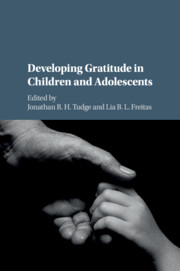Book contents
1 - Developing Gratitude
An Introduction*
Published online by Cambridge University Press: 07 December 2017
- Type
- Chapter
- Information
- Developing Gratitude in Children and Adolescents , pp. 1 - 22Publisher: Cambridge University PressPrint publication year: 2017



